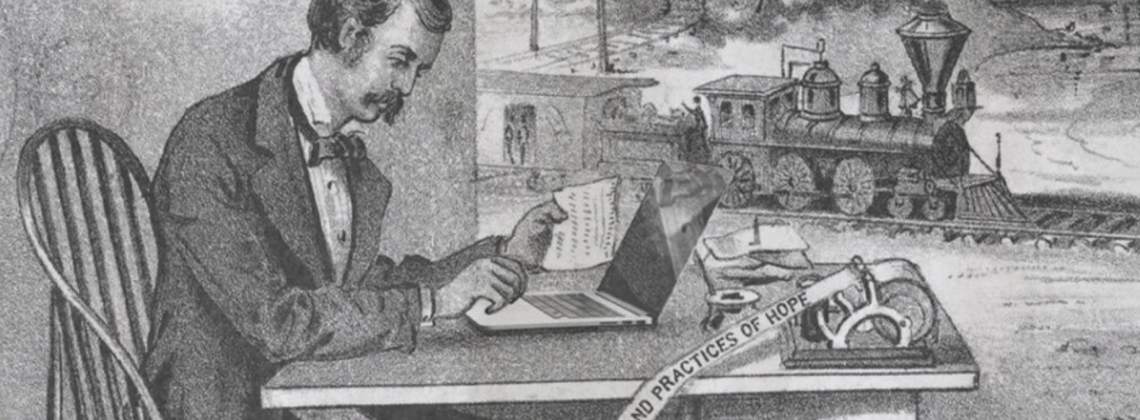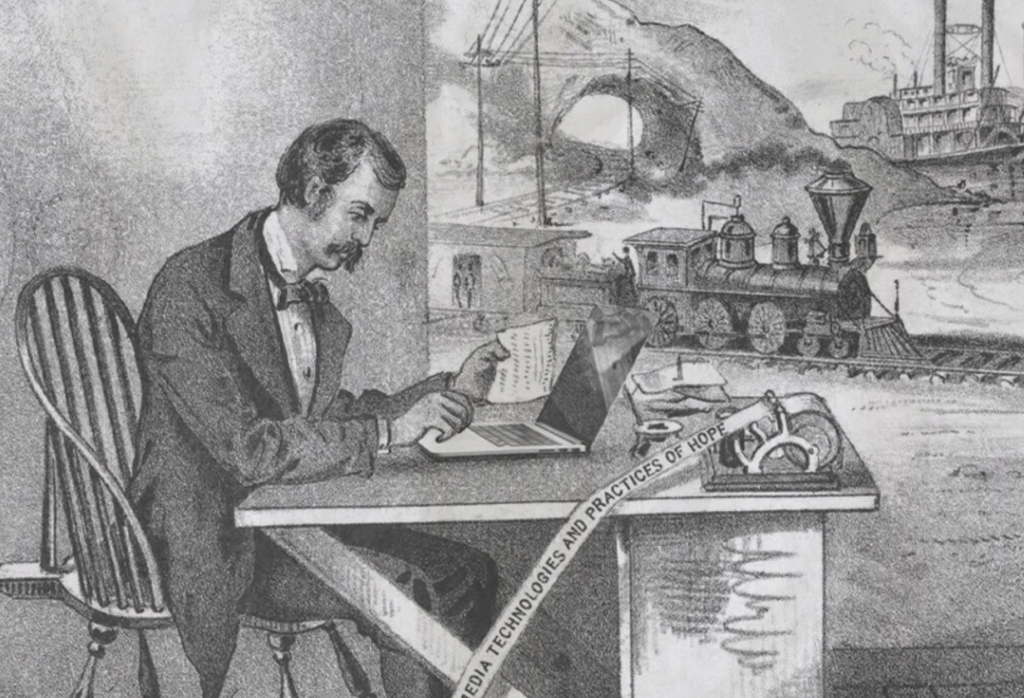

Don’t be a tool
Words for Conviviality: Media Technologies and Practices of Hope by Jeffrey Bilbro. Baylor University Press, 2024. 312 pp., $47.99
In the classic Hollywood Western Shane, the eponymous hero attempts to teach a young boy, Joey, a thing or two about shooting a gun. Joey’s mother, Marian, objects to this training and its violent connotation. Shane retorts: “A gun is a tool, Marian. No better, no worse than any other tool. An axe, a shovel, or anything. A gun is as good or as bad as the man using it.”
This interaction summarizes the underlying theme of Jeffrey Bilbro’s excellent new book, Words for Conviviality: Media Technologies and Practices of Hope. Bilbro is one of the most thoughtful and eloquent commentators writing now on the human encounter with technology. His focus is the humane encounter—maintaining our humanity in the face of an overwhelming technological onslaught of information. Like Shane Bilbro is asking us to think harder about our relationship with tools and technology. Is easy access to information in print and video a blessing, a curse, or a neutrality whose virtue or vice is determined by the user? A concern with these questions comes naturally to Bilbro, an associate professor of English at Grove City College and editor-in-chief of Front Porch Republic (full disclosure: I am a contributing editor at FPR).
Framing the book is a discourse from Herman Melville’s The Confidence-Man. There, two characters argue over the virtues and vices of new nineteenth-century printing technology that made books, magazines, and newspapers readily available to Americans. On the one hand, the explosion of printed material allows for a wide dissemination of news and information. Citizens are better able to inform themselves on the issues of the day, and educational material abounds. It is now possible to put a Bible in everyone’s hands, spreading the Gospel. On the other hand, people may also encounter lies, prevarications, and vulgar appeals to emotion in pulp fiction or sensational news stories. Melville’s metaphors are the Colt revolver and St. Paul: Does modern printing technology represent the violence of the revolver, or does it bring salvation like St. Paul?
Bilbro uses this nineteenth-century story to remind us that our concerns over information technology are not new. Earlier generations had their techno-optimists and -pessimists too. Some still dream that technology will create community, spread knowledge, and be the foundation for a better informed democracy. Similarly, both today and in the past, there are those who fear that faster access to information only makes us more manipulable, empowering the confidence men of each age with new tools for spreading misinformation. Further, far from a robust encounter with great ideas, many people will immerse themselves in tawdry newspaper scandal sheets or idle celebrity gossip and cat videos. And so Bilbro follows nineteenth-century literary figures as they discuss the technological conflicts of their day—all with the aim of aiding our approach to today’s dislocating technology.
He fulfils this task with laudable skill. In each successive chapter, Bilbro takes a particular nineteenth-century literary work or author and demonstrates how they considered the media ecology of the day. For many authors the rapid advance in printing provided fodder for poetic consideration. How does the ready availability of content influence the common citizen? Further, publishing enterprises must pay the bills. So how does the pursuit of money, including marketing and advertising, shape the publisher, the author, and the reader? Does the possibility of fame—of having one’s work in the hands of large swaths of the population—inspire or corrupt the author? Does the intimacy between author and reader represent the building of community or the trivializing of it? Bilbro ponders these questions and more through consideration of works by authors as varied as Ralph Waldo Emerson, Nathaniel Hawthorne, Mark Twain, Henry David Thoreau, Emily Dickinson, Walt Whittman, and the aforementioned Herman Melville.
Early in the book, drawing on Paul Griffiths, Bilbro makes the distinction between curiosity and studiousness. Curiosity suggests a lust for knowledge based on what it can get us—namely, power. There is a lack of restraint and a willingness to cut corners to gain knowledge. Studiousness, by contrast, suggests discipline, restraint, concentration, a love of knowledge for its own sake, and a recognition of knowledge as a gift. One might think of the difference between Saruman (curiosity) and Gandalf (studiousness), or Dostoyevsky’s Raskolnikov (curiosity) and Porfiry Petrovich (studiousness).
We live in a kind of symbiosis with our technology, argues Bilbro, drawing from Marshall McLuhan and Neil Postman. Shane is likely wrong that the gun is a neutral tool. Does our technology encourage us toward discipline and restraint, or does it tempt us to power and a deceptively easy mastery of a subject? Are we curiously using technology as a shortcut to easy answers? Or do we studiously turn to technology only when needed, and then as a helper not a substitute?
Early in the book Bilbro presents twenty-six theses (one for each letter of the alphabet) on “textual technologies.” A common theme of the theses is that technology is at its best when it contributes to better, stronger relationships. Bilbro makes consistent reference to these theses in the rest of the book. While this requires a certain amount of flipping back and forth, it allows the reader to make a connection between particular points in the text and Bilbro’s larger theory of technology.
Let me use the Mark Twain chapter to illustrate. Twain’s story follows the travails of Hank Morgan, a modern man magically transported back to King Arthur’s time. Living out a fantasy that many of us have had, Hank uses his superior scientific knowledge to dominate others. Overcome by his belief in the goodness of science and technology, Hank disdains the benighted denizens of Arthurian England and endeavors to improve them with a deft application of nineteenth-century know-how. It is precisely this desire to do good, accompanied by his faith in the power of technology, that leads Hank to assume despotic power. In nearly the same instant, he declares England a republic and then slaughters people with weapons of modern warfare. Hank is a perfect example of curiosity triumphing over studiousness. By the story’s end he is neither honored nor glorified but alone, friendless and miserable.
A concluding section of the book provides chapters offering new metaphors to help guide our use of technology: walking, conversation, friendship, and cross-bearing. For example, Bilbro uses Thoreau’s wandering prose in Walden as an example of how good thinking is like a meandering walk. Thoreau eschews didactic, easily digested writing. His winding storytelling, just like his use of contradiction and juxtaposition, require give and take. As in the next chapter, on conversation, Bilbro gives us a sense that our thinking, reading, and conversation are better modeled on the Platonic dialogue—free ranging, unplanned conversation between friends—rather than, for example, a Lockean epistemological essay that grinds on, point by point.
Overall, Bilbro reminds us that anxiety over new tools is not of recent vintage. That is a comfort. At the conclusion of Words for Conviviality, he encourages us to think of our lives as a quest. We are pilgrims who wonder as we wander. There are no “technological or institutional shortcuts” toward salvation. We must do our best and hope for the eucatastrophe that awaits us at the end.
Jon D. Schaff of Professor of Political Science at Northern State University in Aberdeen, South Dakota. He’s the author of Abraham Lincoln’s Statesmanship and the Limits of Liberal Democracy and co-author of Age of Anxiety: Meaning, Identity, and Politics in 21st Century Film and Literature.